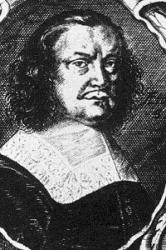Planning worship?
Check out our sister site, ZeteoSearch.org,
for 20+ additional resources related to your search.
- |
User Links
Person Results
Christian Keimann
1607 - 1662 Author of "Jesus, I Will Never Leave" in The Lutheran Hymnal Keimann, Christian, son of Zacharias Keimann, Lutheran pastor at Pankratz, in Bohemia, and after 1616 at Ober-Ullersdorf, was born at Pankratz, Feb. 27, 1607. In the autumn of 1627 he entered the University of Wittenberg, where he graduated M.A., March 19, 1634; and in the next month was appointed by the Town Council of Zittau as Conrector of their Gymnasium, of which he became Rector in 1638. He died at Zittau, Jan. 13, 1662 (Koch, iii. 369; Allgemeine Deutsche Biographie xv. 535, &c). Keimann was a distinguished teacher. He was the author of a number of scholastic publications, of a few Scriptural plays, and of some 13 hymns. Almost all of his hymns came into church use. They take high rank among those of the 17th century, being of genuine poetic ring, fresh, strong, full of faith under manifold and heavy trials, and deeply spiritual. Two have passed into English:—
i. Freuet euch, ihr Christen alle. Christmas. This beautiful hymn is included in 4 stanzas of 10 1. as No. 24 in pt. iv. of A. Hammerschmidt's Musikalische Andachten, published at Freiberg in Saxony, 1646; and is set to a tune by Hammerschmidt introduced by Hallelujah repeated twelve times. In the Unverfälschter Liedersegen, 1851, No. 34. According to Koch, viii. 25, it was composed as part of a piece written by Keimann for his scholars to perform at Christmastide, 1645, and published as Der neugeborne Jesus, at Görlitz, 1646. Stanza iv. may refer to the truce of 1645 between Saxony and Sweden. Translated as:—
0 rejoice, ye Christians, loudly. A good and full translation by Miss Winkworth, as No. 33 in her Chorale Book for England, 1863, where it is set to the original melody.
ii. Meinen Jesum lass ich nicht; Weil er sich fur mien gegeben. Love to Christ. First appeared in A. Hammerschmidt's Fest- Bus- und Dancklieder, Zittau and Leipzig, 1658 (engraved title, 1659), pt. iii., No. 4, in 6 stanzas of 6 lines. It is an acrostic on the dying words uttered on Oct. 8, 1656, by the Elector Johann Georg I. of Saxony: Meinen (i.), Jesum (ii.), lass (iii.) ich (iv.) nicht (v.); st. vi. giving in the initial letters of lines 1-5 (J. G. C. Z. S.) the name, viz. Johann Georg Churfürst zu Sachsen, and then in line 6 the motto in full. Founded on the words of Jacob in Gen. xxxii. 26, it has comforted and strengthened many in life and at the hour of death; and has served as the model of many later hymns. Included as No. 131 in the Berlin Geistliche Lieder, ed. 1863. Translated as:—
I will leave my Jesus never! A good translation, omitting st. iii., included as No. 448 in the Pennsylvania Lutheran Church Book, 1868, marked as Unknown translator, 1864.
Other translations are:—(1) "Never will I part with Christ," by J. C. Jacobi, 1722, p. 80 (1732, p. 132), and thence in the Moravian Hymn Book, 1754 (1886 as pt. of No. 452 altered, and beginning, "Jesus will I never leave"). (2) "I will not let Jesus go," by J. S. Stallybrass in the Tonic Solfa Reporter, Dec. 1860. (3) "Jesus will I ne'er forsake," by E. Massie, 1867, p. 117. (4) "My Redeemer quit I not," by N. L. Frothingham, 1870, P, 185. [Rev. James Mearns, M.A.]
-- John Julian, Dictionary of Hymnology (1907)
Christian Keimann
Andreas Hammerschmidt

1611 - 1675 Person Name: A. Hammerschmidt, c. 1611-1675 Composer of "MEINEN JESUM LASS ICH NICHT" in Evangelical Lutheran Hymnary Andreas Hammerschmidt; b. about 1611, Bohemia; d. 1675, Zittau, Saxony
Evangelical Lutheran Hymnal, 1908
Andreas Hammerschmidt


 My Starred Hymns
My Starred Hymns


